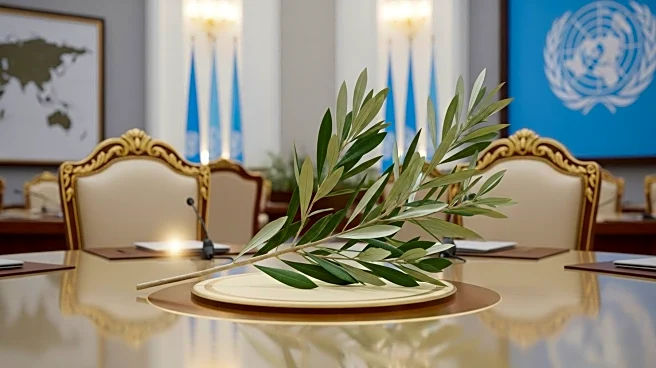What's Happening?
Ronald Lauder, president of the World Jewish Congress, met with Syrian President Ahmed al-Sharaa on the sidelines of the United Nations General Assembly in New York. This marked their first meeting, lasting over 30 minutes, as confirmed by Lauder's spokesperson. The discussion centered on ongoing negotiations between Syria and Israel, aiming to establish a security agreement that could lead to a peace treaty. Lauder's involvement in Israeli-Syrian relations dates back to 1998 when he was appointed by Israeli Prime Minister Benjamin Netanyahu to lead negotiations, resulting in a draft peace proposal that was not adopted. Syrian state media highlighted Lauder's distant Syrian roots, while al-Sharaa, a former al-Qaeda member, has maintained a complex relationship with Israel since leading a coup against Bashar Assad.
Why It's Important?
The meeting between Ronald Lauder and Syrian President Ahmed al-Sharaa is significant as it underscores ongoing efforts to stabilize relations between Syria and Israel. The negotiations aim to address security concerns, including the demilitarization of southwestern Syria and the protection of Syria's Druze population. Successful talks could lead to a peace treaty, impacting regional stability and potentially reducing tensions involving Islamist groups and Iran-backed militias. The involvement of Lauder, with his historical ties to Israeli-Syrian negotiations, adds weight to the discussions, reflecting a broader diplomatic push during the U.N. General Assembly.
What's Next?
The next steps involve continued negotiations between Syria and Israel, with the outcome contingent on ensuring Israel's security interests. These include demilitarization efforts and safeguarding the Druze community in Syria. The talks are part of a larger diplomatic effort by Lauder and the World Jewish Congress, which also includes meetings with other global leaders such as French President Emmanuel Macron. The progress of these negotiations will be closely watched by international stakeholders, given the potential for a peace treaty to reshape regional dynamics.
Beyond the Headlines
The meeting highlights the complex geopolitical landscape in the Middle East, where historical enmities and alliances continue to evolve. The involvement of figures like Lauder, with deep-rooted connections and diplomatic experience, illustrates the multifaceted approach required to navigate such negotiations. The potential peace treaty could have long-term implications for regional security, economic cooperation, and the protection of minority groups, reflecting broader shifts in Middle Eastern diplomacy.










